Fall of Porcupine review
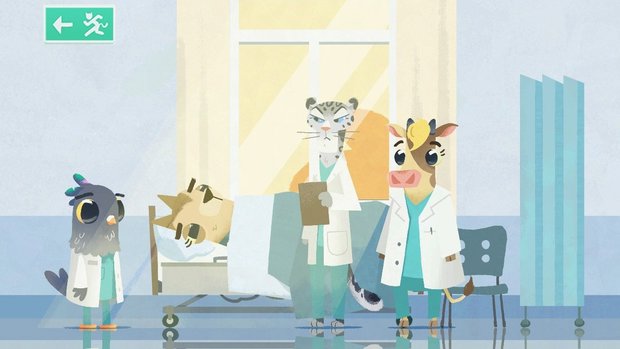
- 0 Comments
Narrative animal adventure comes with a healthy dose of charm and some prickly minigames
Have you ever wondered what it would be like to be a doctor straight out of med school, who just moved to a new place where you don’t know anyone? Oh, and you’re also a pigeon? If the answer is yes, well, that is weirdly specific, but you’ll surely want to check out Fall of Porcupine. And so will many who haven’t, as German developer Critical Rabbit has created a charming and heartwarming game, showcasing some of the struggles and frustrations the health care sector has to offer. Puzzles take a back seat to repetitive and occasionally frustrating minigames, but it’s all lovingly presented with an anthropomorphic cast of adorable animals. The story will definitely tug at your heartstrings, letting the colourful characters and compelling narrative shine as the main stars.
You play as Finley, a young pigeon who has just completed his medical studies and moved to the little town of Porcupine for his junior residency at St. Ursula, the local hospital. A few days into his new job, he has an accident after chasing a patient into a closed-off ward at the hospital. Sustaining a minor head injury, Finley is forced to stay at home for a couple of days, and so begins his story. As he heads back to work, he tries to find his footing in unfamiliar surroundings while simultaneously being a stranger in a city where everyone knows everyone.
Although Finley is new to Porcupine, he has already made a couple of new friends, whom he often hangs out with when he isn’t working. You have Mia the cow, another junior doctor who started at St. Ursula at the same time as Finley, and Karl, a hot-headed but big-hearted nurse ram. Fall of Porcupine is packed full of fun and adorable characters, and everywhere you go, animals of all types and shapes wander around, mostly minding their own business. On his way to the hospital, Finley might meet the mail carrier dog Susi, or bump into Pina, the llama who runs the town's flower shop. At the hospital, he interacts with both his colleagues and the patients, and they are all lovingly and carefully developed, each with their little backstories and personalities. The strict and unimpressed Dr. Krokowski supervises Finley’s work, while Ingrid, the heavyset hippo receptionist, always has a friendly comment.
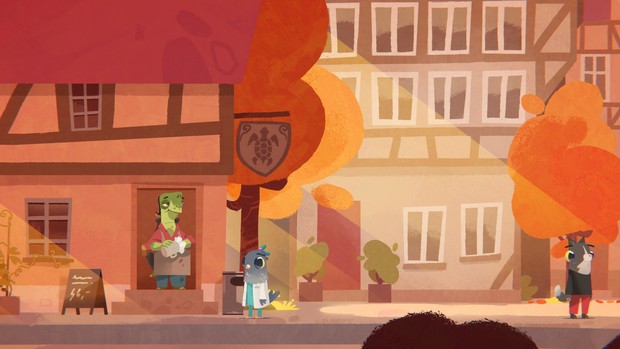
The gameplay is split between Finley at work at the hospital, and his spare time as he tries to figure out his work/life balance. To keep track of his objectives and hospital tasks, Finley has his phone handy at all times. Here he also keeps notes on the other animals he meets in Porcupine, as well as text messages from a handful of family members and some of his new friends. After having downloaded his daily work tasks from his phone, they are displayed on the top of the screen, each day consisting of three patients with different needs. This might be a normal consultation, but it could also be giving out the correct dosage of medications, dressing wounds or doing blood work. All these different tasks are represented with five different minigames, which I will get back to later.
Outside of work, Finley mostly spends his time in his apartment trying to recharge, or out and about in Porcupine, usually with one of his friends. He might pay the nearby pub a visit, or just chat with the locals. The game is set up in such a way that you can choose to focus on the linear storyline and not seek out any other aspects of Porcupine, or you can explore every nook and cranny available in town, discovering fun and unique side stories as you go along. You might discuss philosophical subjects with a fisherwoman, help an awkward teenager writing a comic book, or just learn more about the fascinating story of this place, but all these side paths are just that: optional side narratives that might just as easily be ignored to chase the main story.
Right from the beginning, I got the feeling that something wasn’t quite right at St. Ursula, and the idea that there might be a mystery to be solved somewhere down the road lingered constantly in the back of my mind. Why was the ward on the fifth floor closed off to begin with, and is someone hiding up there? Further along, more and more things unravel into chaos: the people of Porcupine become unhappy with the town’s medical care, and it doesn’t take long before there is an angry mob outside the hospital, demanding change. At the same time, a strange illness spreads among the citizens like wildfire, causing panic and even more suspicion.

Steering Finley through the side-scrolling environments is very simple, whether you play with the keyboard or a gamepad. When something can be interacted with, a circle with three dots will appear over it; the same happens if you can talk to someone. This indicator will only display when you are standing close to the object or person, but it’s not difficult to spot a hotspot when Finley trots by. There are no hints or hotspot locators present, but they’re really not needed since the game is very straightforward.
The art style has a really adorable and playful cartoony 2D look, with lots of bright colours and fun details. Since the game starts out in the fall, vivid orange and red leaves can be seen drifting in the wind and flutter around Finley’s feet as he walks, and when winter sets in, not only is the landscape covered in snow, but Finley changes from his autumn clothes to a charming little hat and scarf to go with his winter coat.
Another thing that really shines is the music, mostly consisting of chill folk tunes that perfectly match the cute and cosy vibe of Porcupine. The soundtrack is almost always playing, sometimes pausing when Finley is at work, where we hear typical hospital background noises instead. There is no voice acting (the characters actually don’t make any sounds at all), so the music really makes a difference to the atmosphere, filling in what would otherwise have been an awkward silence.
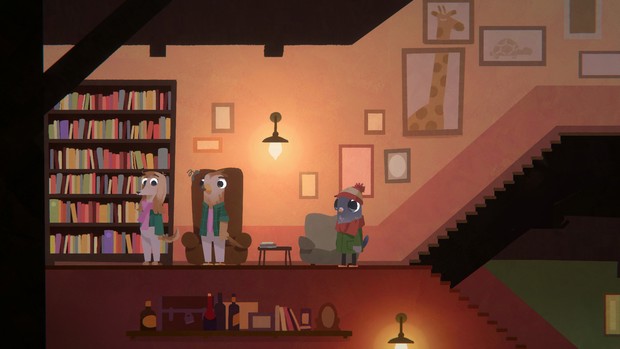
Instead, the characters communicate through speech bubbles, and now and then you can choose what Finley says in conversations. Sometimes you can determine his initial approach to a patient, whether he should be direct and straight to the point or more casual, asking them how they are feeling. In other instances, you choose his response not only in dialogues but also in day to day decisions, such as if he should hang out with Karl or Mia. Big picture-wise, these choices don’t make any difference, but obviously if he chooses to have some beers with Karl instead of making food with Mia, the scenario you don’t pick becomes unavailable. This opens up some replayability to be able to explore all options and interactions. One part of me really wanted to play the game again, just to collect all the achievements and see all possible character interactions, but I already spent around ten hours completing the game the first time through, and that feels like enough.
There are mainly two things that hinder Fall of Porcupine from reaching its full potential. First off, I have to talk about the minigames. The hospital tasks are not only repetitive, but frustrating too, one of them even making me uncontrollably smash the arrows and WASD buttons just to get through. These activities consist of five different games (I’m hesitant to call them puzzles), and your performance in each daily task is graded and evaluated by Dr. Krokowski. You have one game that is just like the good ol’ classic Mastermind, for all you board game enthusiasts out there. Then there is one where you need to find the correct dosage of different types of pills, which was the only one of the hospital games I actually enjoyed. Giving an injection of medicine involves first finding the best place to insert the needle by somehow seeing where the vein is closest to the skin, then injecting the correct dose of medicine at the best place. Another game simply requires you to press and hold the correct buttons in time.
The last one is the absolute worst, a rhythm minigame in which you are supposed to do a diagnostic reading of the patient’s heart or lungs. You need to steer a pointer between up, middle and down as the three-layered readout scrolls horizontally in order to hit the correct symbols as the pointer moves over them. Imagine something like Guitar Hero, just in the hospital. Sounds easy enough, right? But you also need to press the correct arrow up, down, left or right (or face buttons if you play with a gamepad) as your pointer passes over the indicated symbol, making this minigame the main cause of my nightmares for days. Oh, and did I mention that the pointer moves really quick? Because it does. I was never able to score better than a C on those tasks, but other than earning an achievement for getting a perfect score, I don’t think my performance had any impact on the story, other than maybe Dr. Krokowski’s unimpressed comments at each evaluation.
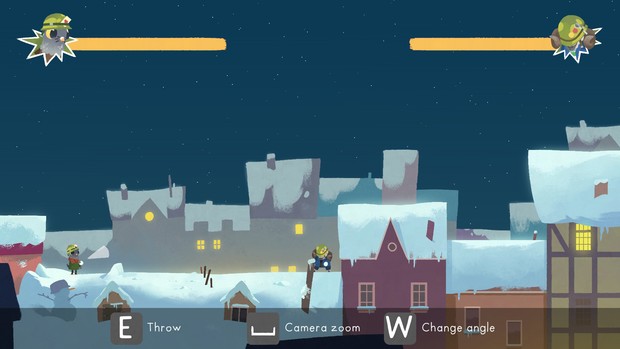
These five minigames are repeated every time Finley is at work, and they become so repetitive and trite that the experience suffers from it. It could be argued that these minigames are supposed to give the player a sense of the frustration and struggle of working in the health care sector, but in a game I fail to see how they add any entertainment value.
Thankfully, there are a few other minigames besides the ones at the hospital, and they are actually really fun. For instance, you have to chop vegetables to help Mia make a stew for the upcoming Hibernation Festival. At one point Karl ends up in a bar fight, which is set up as a turn-based combat minigame, and later you end up in a snowball fight with the same burly ram to decide who gets the last beer. Unfortunately these activities are one-offs, and the hospital minigames dominate the experience when it comes to actual challenges.
The other thing that unfortunately drags the fun down is all the walking. Sure, Finley moves at a fairly quick pace when he is outside, but there’s no way to move faster, or slower for that matter. There is no map of Porcupine, and apart from sometimes being able to take the bus to the hospital (when it is running, that is), there are no quick travel possibilities. I get that the game is built around the player exploring every little corner of town, but for those who aren’t interested in that, some kind of fast travel option would make the experience easier. After all, we are playing as a bird!
One last pet peeve is that the game has no manual save, and the autosave is kind of random. There’s an indicator in the bottom right corner when your progress is being recorded, but knowing when and how it saves is a bit of a hassle. Sometimes it autosaves after you exit a location, but not always. It seemed to save after a certain sequence had been completed, such as after finishing your tasks at the hospital, and upon exiting the hospital or the ward Finley works at, but again, not always.
Final Verdict
Despite its minigame shortcomings, Fall of Porcupine is made with a lot of love, and it shows. The narrative is what really shines, being both well-written and engaging, which is a good thing since the game is so story-driven. It touches respectfully on heavy themes such as the strain on health care workers, loneliness, illness and death, but also friendship, community and finding meaning in our lives, and I’m not afraid to admit that more than once, this heartfelt game brought a tear to my eye. I don’t have any experience with working in the health care sector, but nevertheless, I have major respect for the people who do. After seeing their struggle during a worldwide pandemic and the immense strain it put on them, it is obvious they don’t get the recognition they deserve, and Fall of Porcupine is a beautiful tribute to this hardworking and indispensable group of people.
Hot take
Cute characters, great story, beautiful soundtrack, STAT! Fall of Porcupine may lack in the gameplay department, but it’s impossible to not fall in love with this charming character-driven tribute to our underappreciated health care workers.
Pros
- Great, well-written story
- Fun and carefully crafted characters
- Wonderful soundtrack
- Charming setting presented in a delightful graphical style
Cons
- Repetitive and frustrating minigames
- No quick travel feature makes for a lot of walking
- No manual save, and a finicky autosave
Aurora played Fall of Porcupine on PC using a review code provided by the game’s publisher.

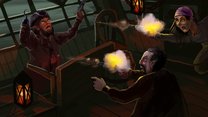




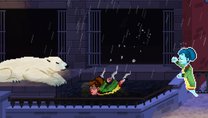


0 Comments
Want to join the discussion? Leave a comment as guest, sign in or register in our forums.
Leave a comment